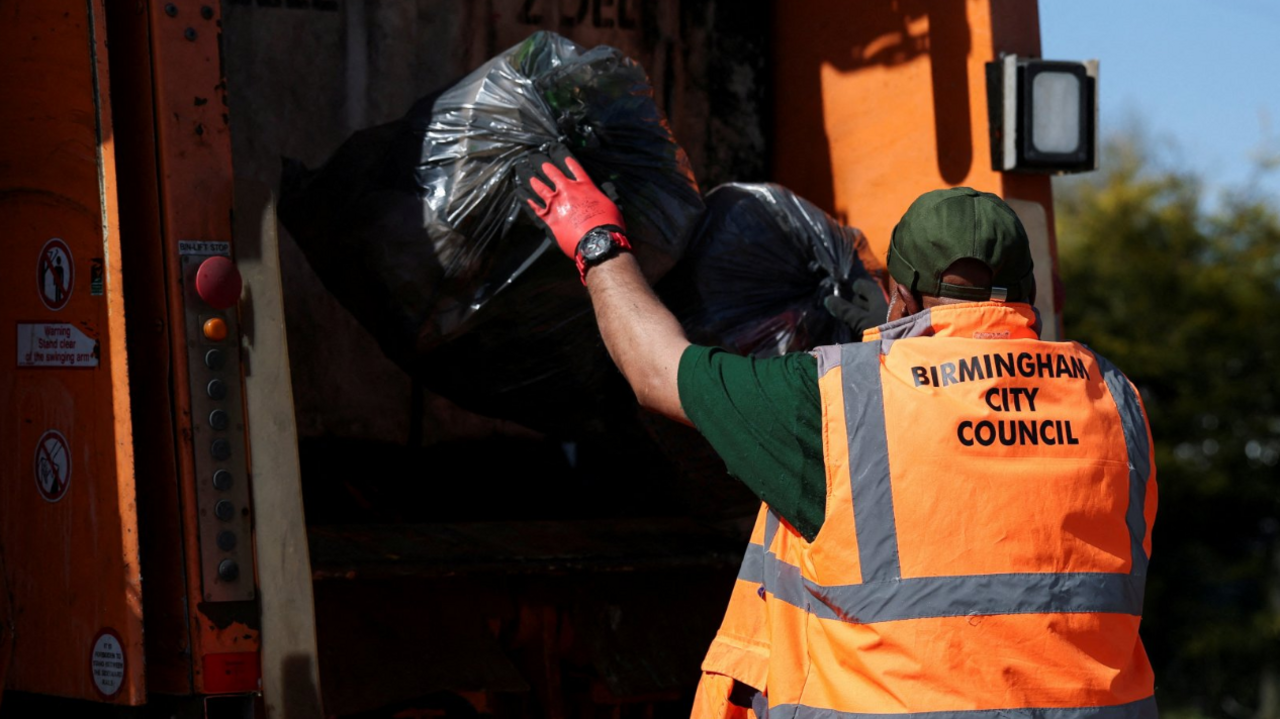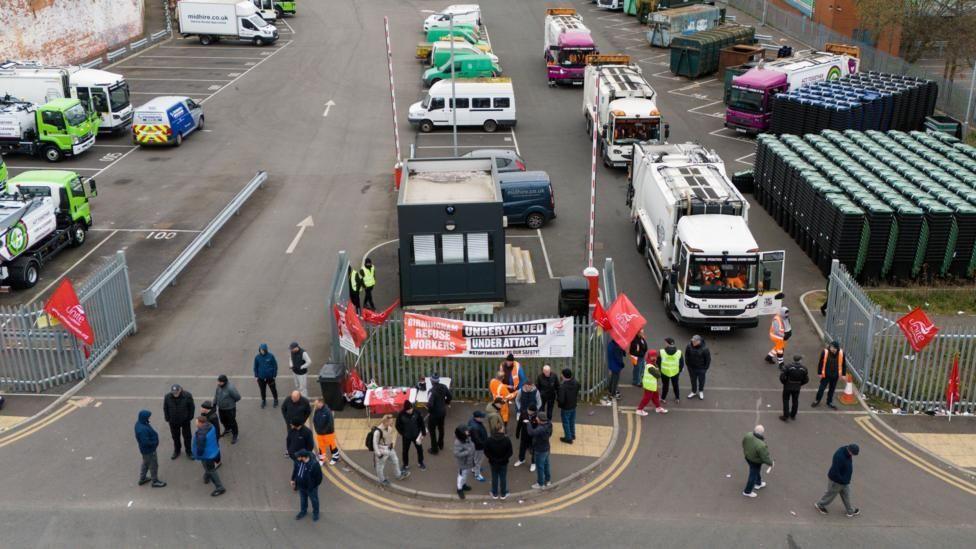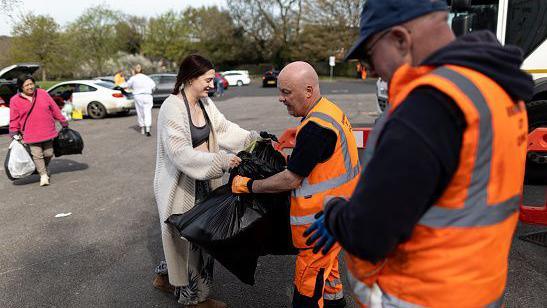Striking bin driver 'kicked out the back door'

Lorry driver Dave Callaghan accepted voluntary redundancy after more than 35 years of service
- Published
A Birmingham bin lorry driver said he felt he was being "kicked out the back door" after accepting a voluntary redundancy package, as the standoff over the city's long-running bin strikes continues.
Striking worker Dave Callaghan, 57, who has worked for the refuse service for more than 35 years, said he had given his "heart and soul" and "blood, sweat and tears" to his job.
Members of the Unite union walked out on an all-out strike almost six months ago in a dispute over pay and plans to downgrade some job roles.
However, talks to resolve the crisis recently broke down, with Birmingham City Council stating it was "walking away" from negotiations last month.

Union members went on strike on 11 March
Unite members walked out on strike on 11 March after claiming Grade 4 drivers could face losing up to £8,000 a year, due to the council's decision to remove Waste Recycling and Collection Officer (WRCO) roles.
Under the council's job re-evaluation process, the role of driver is set to be downgraded, with the Union claiming 170 workers out of the council's 400-strong workforce could be affected by the annual pay cut.
The local authority has defended its job evaluation process as "fair and transparent" and said affected workers had been offered other jobs, voluntary redundancy or pay protection for six months.
But Unite boss Sharon Graham previously said the regrading of workers should be called out as a "fire and rehire" strategy.
'Nobody to say goodbye to'
Speaking from the picket line at the Tyseley depot, Mr Callaghan said he had planned to stay at the service until he was 60. He described leaving as "bittersweet", with his last day set for next week.
The past months of strike action had been "really hard" he added, explaining it was "strange" to be standing out on the picket line for months.
Conciliation service Acas had been mediating negotiations with the union since May, but council leader John Cotton recently said the authority had "reached the absolute limit" of what it could offer.
Mr Callaghan said he had "no respect" for the council anymore and he would rather give his time and effort to his family and health.
"I'm four months short of 36 years [service] and it's not the same job as what I started," he said.
"A lad left a couple of months ago and he had 42 years' service and at the time there's nobody to say goodbye to him, he had to just walk away."

Mountains of rubbish and bin bags, like in this picture from March, built up when workers walked out
Another striking worker, Maxine Stanley, said she did not think industrial action was "getting anywhere" and being off work had been "stressful".
"We don't want to stand there, we want to go back to work but all we're asking is get round the table and get this sorted once and for all," she said,
As a grade 2 worker whose role involves loading the back of a wagon, Ms Stanley is not directly affected by the changes, but has been at the picket line in support of the drivers.
She said she did not think news coverage of the strikes had been fair, with the workers made out to be not telling the truth about the impact of the council's cuts.
Council leader John Cotton admitted in June some workers would lose money as a result of their proposals.
'I love my job'
The council said, external in April that introducing newer vehicles with 360-degree cameras and other advanced safety features would support safe working, in the absence of the WRCO role.
But Ms Stanley said she would not be surprised if workers now had "targets on our backs" and that the cameras meant their every move would be watched, such as needing to return to the depot to use the facilities.
"When I'm a woman, going through the menopause, if I need the toilet and there's no toilet on my pitch, what am I supposed to do?," she asked.
"I don't want to be fired, I love my job. There's only so many women here, but I get on with all the lads and all I want to do is go back to work."

Maxine Stanley said all she wanted to do was "go back to work"
Workers defiant despite summer stalling progress
As the fifth month of this all-out strike ticks by, the mood amongst workers at the Tyseley Depot picket line is subdued but defiant, writes BBC political reporter Rob Mayor.
The boombox pumping out music is gone, as is the BBQ that was once a daily fixture, though a tea urn is still up and running.
On my most recent visit this week, there was a noticeable chill in the air, a reminder of freezing cold mornings when the dispute began.
Whatever your thoughts about the strike, it's hard not to admire the commitment to the cause, especially from those who are not affected by the proposed changes to terms and conditions, but have downed tools anyway in support of their colleagues.
Remember - strike wages from the trade union don't make up all of the thousands of pounds in lost pay.
Birmingham residents cursing their uncollected rubbish may be surprised at the lack of action to resolve the dispute over the last month.

Talks between the union and the local authority broke down in July
I've had conversations with people on both sides who have knowledge of the process, who say it's hard to make progress during the summer, when government slows down and key players take holiday.
Union bosses have met with Birmingham's new government commissioner, but there have been no negotiations since talks collapsed last month.
The workers tell me they feel left in the dark about what's happening and whilst there is anger at the council, some also express frustration about the way their union has approached things.
And whilst some have now accepted that leaving the service, or retraining is the right option for them, there is an overwhelming feeling that this has all gone on too long, for the workers to simply back down now.
Get in touch
Tell us which stories we should cover in Birmingham and the Black Country
Follow BBC Birmingham on BBC Sounds, Facebook, external, X, external and Instagram, external.
Related topics
- Published9 July

- Published4 July

- Published20 June

- Published24 May

- Published2 September
